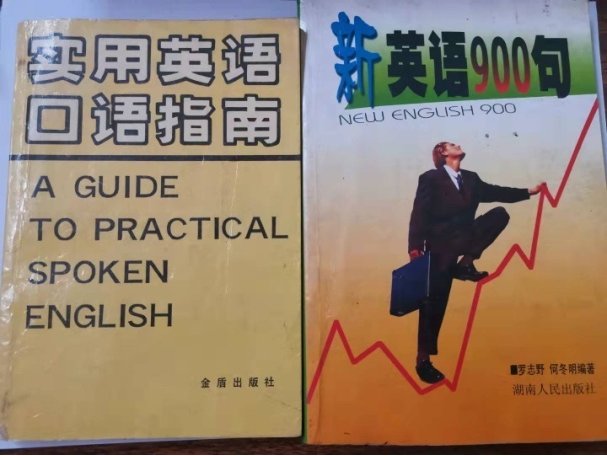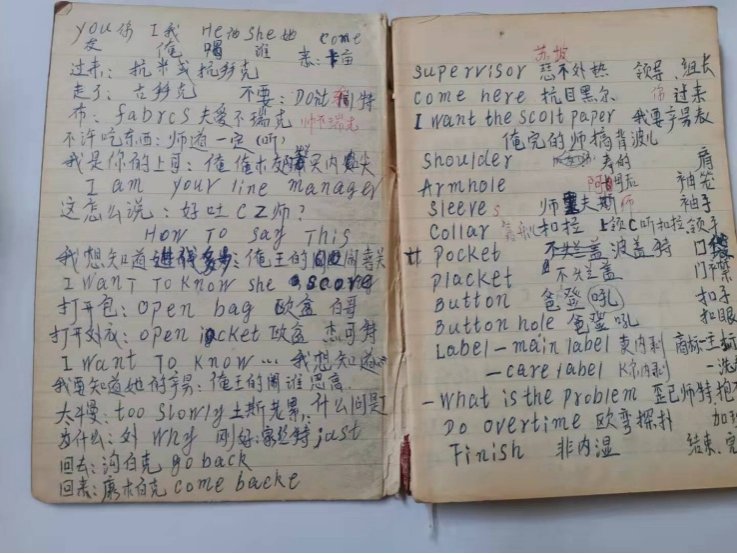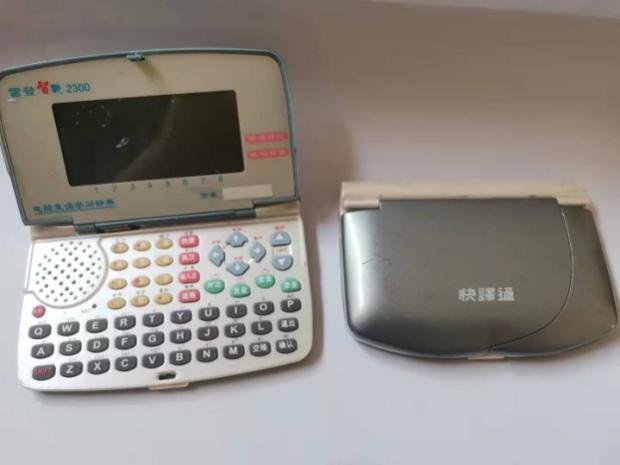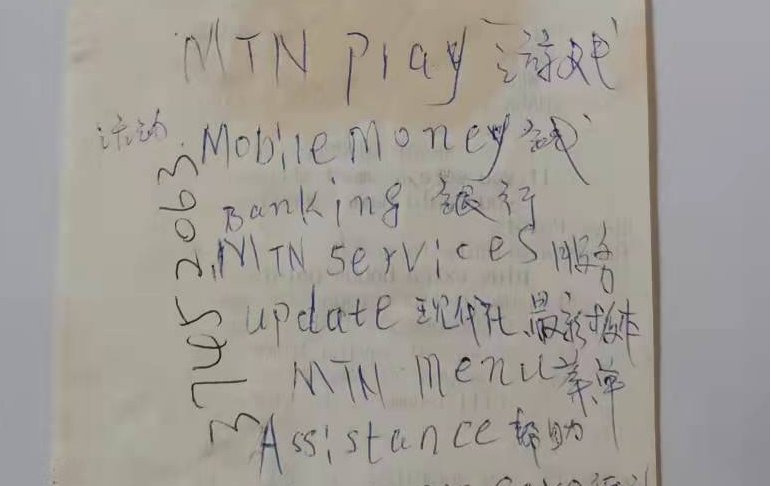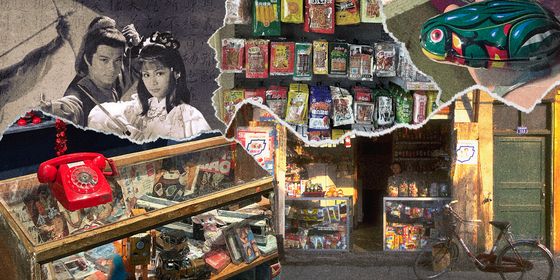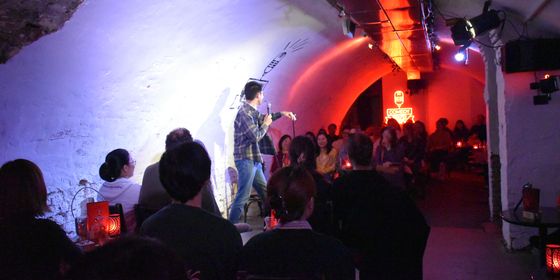How two generations of a Chinese migrant family established a foothold halfway across the world
In early April, I was getting my late father’s bank account balance transferred to my card. The process included a visit to the lawyer’s office, where the elderly Indian man handling my case told me there was a problem: “Your signatures on these documents don’t match. The court may reject our application.” I took a look at both pages. Merely a year separated them, but my handwriting was indeed different: “I started signing my name like my dad after he passed,” I explained.
On my way home from the lawyer’s office, I passed the local cemetery and I couldn’t help but recall an anecdote from a few years ago, when my dad walked past the place himself and joked: “When the time comes, bury me under this yellow soil.” At the time, his comment made me laugh.
Now that he’s gone, I don’t want his remains to stay in this cemetery. Earlier this month, I booked a flight to China with a resolution in mind—taking Dad home with me.
1/8
Both my maternal grandmother and my paternal grandfather had been gainfully employed in a major state-run knitwear factory. This was at the time when factories like this still represented an “iron rice bowl”—job security for life. When my father was 17 years old, he dropped out of school to take my grandfather’s place in the factory. My mother was similarly influenced by my grandmother to join the factory ranks. This was how my parents met and eventually married.
The newlyweds settled down at the family quarters provided by the knitwear factory before I was born in 1991. In my childhood, all of our neighbors were engaged in the textile industry. However, and to the best of my knowledge, my parents soon took an indefinite leave of absence without pay to find more lucrative occupations. They’d work the counter shift at the shopping mall, selling anything on stock: from cosmetics to stationery to kitchen supplies.
The dawn of the millennium heralded a severe setback to the textile industry. A wave of redundancies hit workers at large state-owned enterprises, compounded by the successive closures of printing, dyeing, weaving, and knitwear factories. The loss of their iron rice bowls came as a shock to our neighbors. Whether they were devoted to the work and to perfecting their skills, or were among those who idled on the job and gained no skills, none of them had anything to show on their resumes, and no alternative career paths.
Fortunately, news of the closure of numerous large factories in Shaanxi province reached a host of Chinese enterprises in foreign countries, which rushed in to recruit new workers. Thus, many former textile workers chose to migrate to countries such as Sri Lanka, Mauritius, and even the island of Saipan to manage production lines there. Those who didn't want to go abroad were forced to change careers.
In the blink of an eye, these migrants were sending money back home to buy real estate and even send their own children abroad, too. Yearning for a better future for his family, my dad succumbed to this “emigration craze” and moved abroad as well. He was 38 years old at the time.
My dad’s migration story began in 2001, with a recruitment campaign by a Chinese-run company in South Africa. Dad passed the interview successfully, as did 12 other former colleagues and neighbors, and they got their visas. The night before their departure, family and friends came to send my dad off. For the first time ever, our home was bustling with people. I felt as though I was the only one who didn’t have an appetite, and hoped that the guests would leave soon. I wanted to soak in the precious time I had left with my father.
“Dad, can’t you just not go?” At just 10 years old, I found the choices of adults still largely incomprehensible. I just didn’t want him to leave.
“Dad will go for a few years and come back when he’s made a fortune!” my father replied, changing his glass of alcohol for a smaller one. Though it was apparent he was slightly drunk, he remained fairly alert.
“What do you even want so much money for? I don’t want you to leave!” I started crying uncontrollably.
In fact, that night my father, an adult man nearing his 40s—the age that had cleared all doubts for Confucius—burst into tears in front of me. Life is an ever-ongoing multiple-choice exam. As it turns out, adults are the least qualified to choose the right answer, perennially going through a cycle of cost-benefit trade-offs instead. I held on to my father for a long time, refusing to let go of him as he failed to rein in his emotions. He only repeated over and over: "I will call you when I arrive in South Africa, and if you ever miss me, you only need to write me a letter."
At the airport the following day, I was my father’s shadow. He tried to cheer my weary spirits up by saying with a smile, "Hey, come on here, kid. You’ve got some good pinyin skills there and my name’s too long. I need your help to fill in the boarding pass." As I saw his outline growing distant down the airport terminal hall, I didn’t realize this farewell scene would become our routine for the next decade.
When we got back home, I saw a letter that my dad had penned on my composition booklet. I excitedly asked my mother to help me read it. His letter read:
“My dear daughter, if we want our two-year separation”—his visa was initially issued for two years only—”to really make a difference in our family’s future, we need to make the most of it. Listen to your elders and do your best always, housework included. You and Mom must have each other’s back and wait for Daddy to return!”
My mother’s countenance was hard to decipher. Later, I would come to find out that she had come up with the money to support my father’s visa application. She probably had never really anticipated the ways in which her life would change after he went abroad.
But as long as it was for their child’s sake, they’d give anything a try.
2/8
At first, Mom and I kept up with our letters to Dad, too. Mine were only a few pages long, while Mom’s were a small stack of diaries. I don't know what she wrote in those. Surely she commanded him to take care of himself and not to worry over us; perhaps they also talked of how they missed each other.
In our small neighborhood, everybody knew our story. Still, from the day my dad went abroad, Mom kept all signs pointing to his presence at home—a trio of toothbrushes in the bathroom, a pair of men's slippers on the shoe cabinet at the door, and soot on the coffee table that guests never rush to clean up after smoking. We also made a point of locking the door, even at home during the day. In those years, my mother changed light bulbs, repaired toilets, and moved furniture by herself. What she couldn’t figure out, she would request help with from relatives and friends.
Back then, electricity was still spotty. Once, I turned off the light in the living room, but broke the light cord. My mother’s thunderous scolds issued from her bed: “Will you pay more attention? I’d just fixed it yesterday!” I was in a hurry to go to school, and I didn't understand her vexation at the time. In hindsight, I now see that the likely reason for Mom’s pent-up anger was that she was a petite woman for whom electricity repair duty meant stepping on a stool to reach the switch box. When I wasn’t home, there wasn’t even anyone to hold the stool steady for her. I wonder if she already regretted my dad’s move overseas.
***
My dad was an introvert who had never really traveled far in his life. He probably never imagined that he would move halfway across the world. His new whereabouts were vastly different from everything he’d known in Xi’an, starting from the weather—which was not at all what he expected of Africa.
Dad kept his promise and started writing home immediately from South Africa. In his letters, he shared anecdotes of his new, everyday life and the people he met along the way. Each of them closed with his signature optimistic one-liner: “As long as one person eats their fill, the family won’t go hungry! Everything’s fine, don’t worry!”
However, reality was not quite as rosy. While my dad and his peers were skilled workers, none of them could speak a word of English. They couldn’t even ask the local workers to hand them a screwdriver.
This unlikely crew of middle-aged men were thus tasked with learning English, and they made do in their own unique ways. Some had the foresight to throw some English textbooks in their luggage; others got themselves a Wenquxing pocket electronic dictionary, while the rest just got a notebook.
After work, the men would whip out these tools, holding on to them as though they were a lifeline, and start memorizing vocabulary. Their success in South Africa depended on whether they could manage simple communication with the locals. Motivated by this fact, the men copied their English words meticulously and listened to the pronunciation on their electronic dictionaries. They then wrote Chinese characters to approximate the sound under every word in their booklets.
The pocket dictionary was such a useful tool that it could even help with English names. However, Dad decided against taking a local name for himself; he thought it’d be too easy to use the same name as someone else. In the end he instructed the local workers to call him by his surname: Zhao. It was easy for them to say, and unique.
In addition to all of the above, my dad also tried his luck with a method that called “ear filling.” For example, mobile phone companies in South Africa notified customers of every successful transaction via text. Dad would dissect each message with the support of his Nokia mobile phone reading function. People would tease him saying: “What’s the point of having the phone replay that stuff over and over if you still don’t understand a word?” However, my father would not budge: “Why, that’s exactly the point. I’ll eventually get it down after a bunch of times.”
Admittedly Dad was always stubborn, but his approach to English learning wasn’t all that bad. His study notes were all over the place, and sometimes he would even make the most of the text on his supermarket cashier receipts, copying everything down and translating it word by word with his pocket dictionary.
English learning is certainly no walk in the park for middle-aged textile workers starting from scratch after a lifetime making clothes. However, life had far more complex challenges in store for them.
At first, our communication with Zhao consisted mostly of long-distance phone calls in addition to letters. At the time, 100 yuan wouldn’t even get you a full 20-minute phone call. I was excited for our first call from Dad, but when the moment came, I wouldn’t stop crying. Mom wiped away her own tears and urged me not to waste time: “We can’t afford crying on the phone!”
My excitement for these phone calls with Dad lasted well into my college years, puzzling those classmates who were not acquainted with my family situation. Little did they know, my dad only returned home once every couple of years. On the occasion of his first visit, my mother and I happily daydreamed of all kinds of family fun. However, Dad’s short stay of 20 or so days barely sufficed for him to make the rounds to the homes of relatives and buy some stuff before heading back out. Later, I heard that Dad had originally intended for Mom to join him in South Africa, leaving me at an aunt’s house. Fortunately, Mom didn’t agree, so I didn’t have to spend my childhood living in other people’s homes.
Every time my mother and I went out for a good meal, she’d say: “When your father comes back, let’s go there together as a family.” Our plans to enjoy roasted lamb, Xinjiang pilaf, and buffets in his company never quite came to fruition either. However, Mom did manage to get all three of us to sit for a family portrait each time my dad visited home in the first few years.
I reckon it was around 2011 when Dad dropped on us the sudden announcement on one of his visits: “I’m not coming back next year. It’s such a pain to hop on a plane for 20 hours. There’s no point in it, I’m exhausted.” Was his affection for us so weak that he actually didn’t see the point in visiting us? That day, I locked myself away in my room for a good cryfest. I can only imagine how sad Mom must have felt herself.
That year also marked the end of our family portrait tradition. On a subsequent visit, Mom fixed for my father a bowl of handmade noodles so that he could enjoy the taste of home for his breakfast. However, Dad took a glance and whined: “I want to go have hot pepper soup by the stall downstairs.” My mom later said she was so furious, she got a cramp in her thighs.
To be fair, Dad was not looking to pick a fight with Mom. He’d been working for a southern Chinese boss in South Africa, so his stomach could no longer handle the bowl of noodles that marked the start of the day in his own northern hometown. It wasn’t even an item on the menu abroad. Plus, he really was craving a bowl of hot pepper soup from the Hui Muslims’ stall outside. However, it was also true that my dad had long been blind to the feelings of those around him as a result of his prolonged, lonely fight abroad for himself and his family’s sake. Even if he did not intend it, his words could sometimes pierce your heart like thorns, leaving a gaping wound from which feelings started gradually bleeding away.
Time can change everything. The flow of correspondence between Zhao, the allegedly eternal optimist, and his family gradually drained until he stopped writing altogether. For a while, we even ran out of conversation topics between us. Distance had wedged in akin to a diverging force in our lives, and it seemed as though we no longer felt a need to listen to each other.
With time, online messaging platforms such as QQ and WeChat became increasingly convenient. However, they did not really improve our communication. I came to the gradual realization that I was different from other girls my age, and I think it’s likely that Mom felt similarly herself. After years on end running the household on her own, with Zhao’s seat empty for so many Lunar New Year holidays, Mom’s frequent remark was: “Have you noticed how independent we are nowadays? I’m not used to having another person at home.”
3/8
Admittedly, Zhao’s life on the other side of the world was not something either Mom or myself was capable of imagining at the time. One of his colleagues later recalled that though their first large factory in South Africa had its own canteen, every day it was the same meal of potatoes, kohlrabi, and chicken. There were only so many ways the cooks could combine the cheapest local ingredients on a daily basis.
Zhao’s fellow Chinese workers were all born in Shaanxi and raised on noodles. Their stomachs thus shared a certain bond and soon enough felt the effects of their daily rice servings. Noodles were now a special meal reminiscent of Chinese New Year. Eager as they were to sample the flavors of their motherland, Lao Gan Ma chili sauce became the next best thing for these gentlemen in order to satiate their oily and spicy cravings. It was truly a match made in heaven—on noodles, rice, vegetables and more.
The plight of these men was hardly unique; nostalgia for the flavors of home abroad is all too common of a phenomenon. A Shanghai worker had brought with him a small jar of tiny drunken crabs that he rationed with great care—only two crabs about the size of big thumbnails for each large bowl of rice. Sausages were the prized topping of choice for Sichuanese workers to elevate their steamed rice. At mealtimes, the rice pot shrouded diners in the steaming fragrance of the sausage-dotted Thai rice, evoking familiar flavors that brought these grown men close to tears.
However, after a decade abroad this culinary nostalgia vanished as everyone became seasoned veterans of the Chinese community in South Africa, eventually growing accustomed to the local climate, diet, and even cigarettes. I have hazy, distant memories of the way that Zhao and his peers, on one visit home, enlisted their relatives to gather as many local cigarettes as possible for them to bring back to South Africa, reluctant as they were to try the local brands. But they now came equipped with South African cigarettes on their visits to the motherland, claiming that Chinese tobacco burned their throat. They would have been loath to admit it, but the truth couldn’t be denied—there’s no real coming back to your motherland once you leave it.
My father was no exception to this pattern, nor was he spared from the passing of time. His hair was now increasingly salt-and-pepper and his smile highlighted the wrinkles on his face. My insistent pleas that he return to China were met with silence. Whenever I pressed him, he would stand his ground stubbornly: “Just a couple more years and I’ll get you a car when you get married.”
Zhao was far from being a gifted singer, but he took great pleasure in belting along to the tunes of several variety shows he’d grown fond of in his spare time. He was also an avid consumer of celebrity gossip, always in the know about every new hit and every new relationship. What’s more, he also stayed up to date on the latest news by means of short videos. He had his own user account, complete with a bio: “Just a regular guy, busy flying around.” Dad was also a first-hand witness to the rise of the small South African city where he lived. Just a little over a decade ago, locals lacked even a pair of shoes—now they could often be seen driving luxury cars. As for himself, visa worries were a thing of the past now that he had been issued with a permanent residence permit, but what about his career?
***
Some of Zhao’s original cohort of migrants had returned to China, while others had gone on to run their own factories. Small as their new endeavors were, they stood as fruits of their hard work. Zhao could neither drive a car nor speak professional English, and though he was well into his 50s, his retirement was a distant possibility. What was he supposed to do in China at his age?
He had a point. Shaanxi's textile industry had undergone tremendous changes in the two decades since their departure. How could he could possibly catch up? In South Africa, despite their age, men like Zhao could still earn tens of thousands of yuan a month. In China, retirement would be the only fate awaiting their return.
I was already in high school when relatives tried to talk Dad into new career avenues over drinks: "Zhao, why don’t you open a factory?"
"No way, it's not the right time." I noticed that my dad's expression was a little gloomy. He may have forgotten his own words once he’d sobered up, but I wrote them down. This much I know—the wanderer may be homesick, but they still carry the burden of their unfulfilled dreams.
4/8
My peers were riddled with anxiety before their college entrance examination, but my mother reassured me: “Don't be nervous. If you don’t pass your exams, you can always just start a business.” Zhao had been abroad for the entirety of that year, so he hadn’t been of any help with my studies. I didn’t have any special instructions to guide me as I sat my exams, let alone a clue on a choice of majors.
With this being said, I did make it to college and went on to complete my degree. Dad texted me before my graduation: “Kids these days all go traveling after finishing school. Where are you planning to go? My treat.”
“Dad, I have already secured an internship with a Fortune 500 company.” I replied. “I’m already getting my salary and everything.”
“When are you going to enjoy yourself some if not now?”
At the time, I ignored Dad’s stories of graduation trips because I was fully committed to my career. In fact, I had a goal to become the director of my company’s HR department. Unexpectedly, I soon grew tired of my workplace. I had always wanted to start a business, maybe as a result of my family history. In my 24th year, I opened the doors of my brand-new aromatherapy parlor to the public for the first time. I saw it as a birthday present of sorts to myself and immediately took to my role as an entrepreneur, making money during the day and taking Mom on shopping sprees in the evening. However, my dad rained on my parade on his next visit home: “That shop of yours is grinding you down. You think it’s fine now because you can sleep in every morning, but wait until you’re burned out.”
For the first time ever, I had no time to spend with Zhao during his visits home. He had to keep himself company, watching TV and killing time online. Soon, he flew back to South Africa. When I told him that I was in a relationship, he just texted: “Don’t forget your wallet when you go on a date!”
With our love affair in full swing, I envisioned an imminent engagement to my boyfriend, except I was then hit by yet another picture that my best friend had sent me of her husband and their joint family on the occasion of Chinese New Year. She had always shared her happy family moments with me, whether it was just herself with her parents, or her newlywed bliss with her husband, or later their own family with two children and a large dining table.
I’d never been one to envy others’ wealth, but these joyful images struck a jealous chord within myself. A sudden thought seized me—just how many more reunions did we have left in our shared lifetime, assuming that Dad made it into his 80s? The more I dwelt on the gaps of my childhood, the easier it was for me to fixate on everything. Eventually, I decided to set a new goal for myself—I would travel to South Africa, where I would be a companion to my father while setting everything for our family’s reunion there. All of this, of course, before tying the knot myself.
Looking back, I had no real plan. I just announced to Dad: “I’ll go with you.” He prepared various documents that facilitated my visa application accordingly. Once again, I asked my mother: “Will you come with me to South Africa?" This time, she simply replied: "I will follow you wherever you go.”
At the end of 2016, I set off from Xianyang Airport carrying my Chinese pipa and two suitcases—one large, one small. I caught a connecting flight in Hong Kong, and 13 hours later, I finally set foot in South Africa. Zhao came to pick me up, dressed quite formally. His suit was neatly ironed and his white shirt showed only the slightest hint of yellow. Later, I learned that he’d hemmed and hawed on wearing a tie, afraid that he’d embarrass himself with such excessive formality.
Sickly sweet hugs were out of the question for us hardened Shaanxi folks, though I could see that Zhao wanted to start a conversation. However, our time apart from each other stood as a stumbling block. In lieu of words, I held his arm and felt his joy. Reuniting with his daughter here after working hard for so many years did also qualify as an achievement.
In due time I heard of Zhao’s concerns about my first time abroad at my ripe old age. He feared that the one-way ticket I’d bought would not get me past immigration, or that people would take advantage of my hypothetical lack of English skills, or that I would fail to find my way out of the airport. He insisted on buying me a return ticket, happy to spend the money even though he knew that the chances of a refund were slim.
Then, an Indian lady who worked with Zhao sang my praises: “Where did your daughter go to school? Her English is excellent."
Dad perked up immediately and took it upon himself to tell everyone around: "You see, I thought she couldn't speak English, so I’d bought her a return ticket. But look how capable she is!"
Though I mistakenly took Dad’s tirade as a dig, his words were nothing but standard Shaanxi humblebragging. It then dawned on me that he was beaming with pride.
At first, I stayed with Dad at his factory. Though I’d foolishly volunteered to cook, I stood no chance as an inept chef faced with shelves of unfamiliar seasonings and unique ingredients. There was otherwise very little to do in my new surroundings. The wi-fi connection was often unstable, so I killed time by browsing cooking apps, playing the pipa, paging through my English dictionary, watching American dramas, and waiting for Dad to come home.
Zhao took me for a walk at the industrial area every day after finishing his shift. We couldn’t go far without a car, but I was elated with our one and only pastime. Holding Dad’s arm on our walks, we stirred the jealousy of his peers. Zhao had put on quite some weight, to the amusement of everyone pointing at his girth.
Once I learned that my Chinese driving permit could not be validated directly for a South African driver's license, I began to prepare in earnest for the local driving test. My plans were thwarted by the traffic bureau’s refusal to issue me with a traffic code number on the grounds of my status as a foreign alien on a family visa. I had to go back to the driving school, find the principal and address a really long letter where I pleaded for approval from the Department of Transportation. It took a full month, but they finally agreed to give me a traffic code number.
You can drive your own vehicle for the driving test in South Africa, quite an advantage for newbie drivers. The road test here is much simpler than in China. All you need to do is park in the garage in both a straight line and from the side before taking the examiner on a circle run along the designated route. Strangely, the ever-vigilant gaze of the local police dissipated now that my South African driver’s license had replaced my Chinese driver's license and notarized certificate.
One day, Zhao suddenly remarked: "We haven’t gone out on a walk since you got that car, right?"
Now that I look back on the past, the car did indeed bring our precious time together to a halt.
5/8
Zhao seethed with envy whenever we walked past other factories. I was well aware of his feelings as his 50s gradually drew closer to an end; he thought he had no accomplishments to his name. I devised what was really the next step in my master plan for our family’s reunification: We were to open a clothing processing factory together, and the road to success would be paved by my dad’s lifelong factory running expertise and my entrepreneurial knowledge. Though I was now toying with the idea of staying in South Africa long-term, my boyfriend at the time was not on board and our relationship petered out.
In October 2017, Zhao and I started looking for vacant factories to lease. Our assessment of the industrial area made us realize that we were looking at a whopping 28 rand per square meter for the very most basic of facilities, in spite of the market price supposedly being marked at 18 rand per square meter. Dad gave it some thought before declaring: “Well, it is what it is!"
Again, he was right. One month later, we closed on that deal. In an area no more than 700 square meters, plus a yard, Zhao’s dreams were now finally fulfilled.
In January 2018, our small garment processing factory officially opened its doors, registered under the name “Ziffer.” I came up with it after playing around with the pronunciation of my own name, which was a combination of my parents’ names. All in all, an omen for my beloved final goal, which now felt closer than ever.
With our small staff, for the time being we were forced to limit our operations to second-hand processing from bigger factories. This, in turn, had me setting out on delivery duty every two days. This was quite the change in work volume from my days as an industrious little white-collar ant.
At that time, my biggest worry was that I didn’t have time to cook. I turned to the local aunties around for guidance and they taught me to stop fretting and start stewing meat, boiling tea eggs, and making soup. I longed for my mother’s support. I made sure to video-call her often, showing her snippets of our ever busy workers and the open space in the yard, where I envisioned for her the idyllic life she’d always dreamed of, a life where she’d tend to a small back garden, vegetables and a small flock of chicken.
A month later, my mother landed in South Africa with her sparkling new visa, just about the time when I met the man that would become my husband. He was a guy working around 300 kilometers away, and I begged him to come join us at the factory for my long-awaited celebratory family meal.
Seventeen years of separation were now coming to an end for my kin, or so I thought, elated at my accomplishments. Needless to say, our cooking woes also came to an end as my mother tied the strings of her apron in the kitchen.
However, problems were not far ahead. With a staff of only 12 people, paid weekly according to the volume of their work, our high turnover was proving to be a pressing concern.
The human resources management strategies that I had acquired in China were of little use here when trying to stabilize our meager workforce. Workers relied on their productivity to increase their weekly wage. However, in a country where many subsisted on a loaf of bread a day, workers just seemed content to avoid extra work. Workers bailed out on us for a myriad of reasons. Women would join one day to quit on the next, head over heels in love with some factory beau by the end of their sole shift. As for our male workers, when I tried to motivate one of them to take things seriously so that he could be promoted to manager, he was unimpressed: “What for? So much pressure, so much work, it’s not even that much money.”
Every Friday, this man clocked off at the exact time with his weekly wage in hand, headed to whatever bar where he’d drink the money away and charm the socks off whatever beautiful girl he could fool, jumping from one sweetheart to the next at a pace that would have livened up our production line at the factory. Raised with Dad as my role model, a frugal man who had never had much fun at all, I was puzzled as I saw this man squander his money on a pair of sneakers worth 2,000 yuan, after replacing the teeth he’d lost in a fight for a whopping 6,000 yuan over Christmas. He even got a car that he then sold the minute he failed to keep up with the payments.
I often felt frustrated at the failure of my grand management techniques. Frustration gave way to anxiety over the holidays, because I was aware that our workers would not honor their contract. In China, everyone—from the cleaners to the general manager—had three days off before going back to work, no slacking allowed. But in South Africa, workers were seemingly free to do as they pleased, without any approval needed from me.
In our first year up and running, each month began with my worrying that nobody would show up. Fortunately, a friend introduced us to a local manager. Slowly but surely, he managed to imbue some crisis thinking in the staff and got them to ponder over their future, rather than simply living in the present. He even established a so-called “compulsory savings club” where folks kept an eye on one another’s savings. Thus, our issues with workers’ turnover gradually eased some.
6/8
In less than half a year after we’d opened the factory, Zhao lost all the weight he’d gained. Exhaustion was written on his face, though he still had it in him to joke: “Isn’t this wonderful? Folks pay to lose weight and I get in shape for free!”
As for my mother, she never quite adapted to life in South Africa. She held frequent video calls with her relatives in which she would tearfully denounce my neglect of her: “Nini has locked me in the factory.” I could understand that Mom liked going out, but she couldn’t drive and we simply didn’t have time to take her out.
What’s more, the relationship between Mom and Zhao became increasingly fraught with tension. How could there be any feelings left between a couple after almost two decades apart? Money was often the last symbol of familial unity for families after prolonged periods of separation. When income from these migrants dries up, chances are they’ve cut off contact with their relatives for good. The role of a husband can only be truly fulfilled by a man whose presence is near and dear. A distant vagrant some 10,000 kilometers away hardly counted.
However, this only dawned on me much later. I had assumed that if only I worked hard enough on my own, my family would be able to reunite and time would magically heal our emotional turmoil. But I was wrong: We had exhausted our bonds. Now that they started living together again, my parents couldn’t make any sense of each other. Often, they lived in a state of cold war. Even though I was already 27 years old, the choice words they exchanged between them shocked me as though I were 5 again.
An entry from that time in my diary reads: "Perhaps I did something wrong. Why is everyone still sour after we reunited? Am I not worthy of such simple happiness?"
All my attempts to comfort Mom were futile; she still wanted to return to China. Zhao himself did not try to stop her. Time did not heal any wounds, but it did teach me a truth: sometimes, everyone’s comfort is more important than family reunification.
In May 2018, my mother returned to China, leaving Zhao and myself behind to continue our struggles in South Africa. Though we retained the appearance of a nuclear family, our work had made it so that we rarely had time to sit down and share a meal.
The day my mom got on the plane, I realized that my dream had been finally shattered. Two months later, I became pregnant, and my husband joined us at the factory.
***
In January 2019, an Indian man came to us with a sample for a tiny gauze skirt fit for an infant and asked whether we could make it. Initially, I dismissed his query: “Sir, you must be kidding. The process for producing this kind of clothing would be far too complex.”
However, the man insisted that Zhao himself took a look. The sample had been originally cut by another factory, but they dropped out of the deal. As a result, the man was now looking for another factory that could salvage the mess. My warning followed Zhao’s steps into his office: “Just take a look. Don't be impulsive.”
Zhao hadn’t made such complicated clothing in a long time. In his excitement, he looked like a hungry wolf eyeing a chicken. He took the skirt and glanced at it before calculating the processing fees. Five minutes later, he’d accepted the order.
Now that we had given our word, I spent my days anxiously checking the delivery date on the calendar. We were short on hands, so Zhao urged our staff to rush themselves on the production line. It was the first time that our workers were tasked with such complex work. Their skills certainly did not match the challenge, and they complained daily about the pay. Our industrial steam iron was the smallest model on the market and just about as efficient as a household iron.
Though the process for the small gauze skirt took about 35 steps on the production chain, we actually managed to meet the delivery deadline. We were all exhausted and some workers even quit, unable to bear the ordeal. However, Zhao’s outstanding knowhow meant that we had finally opened the door to our family-run factory processing orders directly. I could feel his sincere pride, from the bottom of his heart.
Though we were now even busier, our profit margin had improved as well; we were even able to raise the workers’ wages. Thus, I met my targets or the business in the first year after we opened the factory.
***
In April 2019, as my due date approached, my mother returned to South Africa with mixed feelings. She was worried that her daughter would give birth in a foreign country all by herself, but she greatly disliked life at the factory. “It’s like going to jail.” She did not want to face Zhao, but the baby’s imminent arrival brought the family together once again.
However, though Mom was now holding her granddaughter, her predicament in South Africa remained largely unresolved. With the baby still a while away from reaching the traditional hundred-day milestone, Mom suggested we go back to China. Though the local woman that we’d hired as a nanny had just left due to some issues at home, I didn’t want to force my mother to stay, so I immediately bought her a plane ticket. With a look at my child, who depended on me for her sustenance, and our newly hired workers, I figured that if only I were stronger, I would be able to survive.
7/8
During the day, I stayed at home taking care of my child with an eye on the monitor. In spite of this, I couldn’t fully supervise the production line, and we encountered quality issues with some orders. We had to redo some orders, and even refund some customers. My cash flow soon dried up.
For the first time, I felt that life was truly much too difficult for me to handle on my own. I had to ask my mother to come back, “or the factory will have to close its doors.“ As soon as she entered the house and cracked the refrigerator open, she was greeted by cockroaches. We had less than 1,000 rand in our pocket after paying the workers, and I’d had to give up on the thought of a new fridge.
Funds had probably never been so tight in my entire life, and we endured a bumpy ride until Christmas 2019 came around. With our staff back home for the holidays, we took our daughter, who was six months old at the time, out for a leisurely walk. After a year with little income other than deductions from plane tickets and orders, we had basically run out of money. I was determined to just roll up my sleeves and keep up the good fight, but in January 2020 my mother announced that she was not feeling well and subsequently returned to China.
I cried daily, but I had to grit my teeth and continue working. Admittedly, I had thought about going back to China myself, but what would become of Zhao then? He had long been unable to adapt to life in China, just like my mother had proven unable to stay put in South Africa.
***
On the second week after my mother’s return to China, the pandemic broke out. The Chinese diaspora in South Africa joined forces enthusiastically to donate masks and protective clothing to our home country, but soon enough South Africa closed its borders to better fight the virus. Before, we’d worried about our tight cash flow—now, we were faced with complete ruin. Many landlords waived half a month’s rent for their tenants, and we were hoping that our landlord would be merciful as well. However, shortly after the lockdown was lifted, we received a letter from a lawyer asking for the overdue payment.
In July 2020, my daughter turned 14 months old just as the second wave of the pandemic hit in full force in South Africa. After a family quorum, my father and husband stood firm and I retired to safety with our daughter to a small apartment 300 kilometers away. My husband came every two weeks for a big grocery trip. My daughter was now learning her first words and steps. This was my fourth year in South Africa, and I had the chance to experience life as a stay-at-home mom.
When I first came to South Africa, I made an account on an online platform where I could publish my own blog posts, which were often featured in the homepage. However, later on I found myself too short on time to even think, let alone write. Now I made the most of my daughter’s unsupervised play time to find new topics to write about, and I’d draft blog posts while she napped. With each successful pitch, I would pour myself a cup of black coffee and write in the evenings after putting the baby to bed. I started relying on my writing for income from the second month onward, earning over 10,000 yuan per month. With my child in tow, I swelled with pride at the way I was fulfilling my dreams. Every Friday I was still in charge of calculating the payroll, invoicing, and managing payment to clients, but on the whole, I had the luxury of a lot of leisure time. I hadn’t hit my 30s yet and I was living a charmed life—I was so happy that I did not want to return to the factory ever again.
In October 2020, my husband brought up that he and my dad wanted to move our factory to another location. He said to me: "Come back with us. One more year of hard work and we’ll all return to Johannesburg."
In our family, the words “one more year” had long served as our personal carrot-and-stick mantra. When I didn’t make any money in the first year, I told myself that I was gaining experience. When I made a little money in my second year, I thought for sure there was still hope as long as I worked hard. In my third year, I clung to my faith in “just one more year,” and thus we found ourselves in our fourth year.
My husband reassured me: “Don’t worry, your writing won’t be affected by the move. Your dad and I will be in charge of the factory while you take care of the baby and write your articles in the office.” With our daughter growing like a weed and our remaining balance in the bank not being enough to let us sleep in peace, we could only continue to move forward. In spite of my reluctance, I was probably following in the steps of my father in his youth.
In the first week of November 2020, our daughter and I returned to the factory. My dad was thrilled to see his granddaughter again, who was now a steady walker and a chatterbox, but I knew that returning to the factory effectively put my writing career on hold. In order to save one month’s worth of rent, we accelerated the pace of construction and renovation over at the new factory. Eventually, all employees moved in before December.
8/8
The biggest advantage of our new factory was the separate living and working areas. Though we were still dealing with a ton of air pollution, the living environment was much better than before—both for our family and the workers. They could now bask in the sunlight at the oversized yard, sitting in the grass to have a chat after work.
It had been a long while since I’d set foot in the factory. Upon my return, I took charge of the workers. Nearing the tail-end of the peak season, every worker wanted to make some extra money for Christmas, and I found it heartwarming. In the midst of our move, my husband lost the car keys. With the windows still open and the doors unlocked, I had no choice but to leave the car in the new factory at night. At the time, everyone was still living in the old factory. Two hours into the evening, two young workers took the initiative to run over and ask me: “Where is your car?”
“I lost the key and I can’t start it, so I can only leave it there and lock the yard door,” I replied helplessly.
“What if it gets stolen?” they worried.
"Don't we have insurance?” I said jokingly. “Why don't we just lose it and cash in the compensation?"
“Send us both, we’ll sleep in the car at night," the young men insisted.
My heart melted at that moment. Such lovely workers are rare.
At around 11:00 a.m. on December 11, 2020, less than two weeks after our move into the new factory, the dormitory from a nearby factory burned down to its foundations. It had been built in our yard, back-to-back with the dormitory we’d just moved into. All the Chinese factory owners in the neighborhood came to help put out the fire. Not long after, the other party came to discuss compensation. I was speechless. How could they ask us for compensation when the cause of the fire was unknown?
My workers found me and showed me a drawing they’d made while firmly saying to me: "Don’t be afraid, the fire did not start at our place. You see, our quarters were only less than half the length of theirs, but their second half burned down entirely. That means that the fire started at the back of their dormitory.”
The workers brought me a great deal of comfort with their makeshift picture. When the workers from the nearby factory collectively demanded compensation from us, nobody in our staff gave in. What’s more, a group of female workers approached me to ask whether they could give all the funds that had been gathered for the staff Christmas party to the male workers. They reasoned that their male colleagues had suffered the greatest loss, because the three wooden buildings housing them had burned down and they had nothing left, not even a change of underwear. Their words moved me again.
***
Just when I thought I’d met the best employees to ever grace the world, I went through the worst nightmare of my life.
On December 19, 2020, the factory was under the spell of the Christmas holiday. A large number of workers who were rushing home to celebrate with their families left early in the morning. At 6:30 in the morning, Zhao got up as usual to help the workers open the door. He was then unable to fall asleep again, so he hurried to the empty factory to cut up some clothes. Even after all these years, he was still unable to relax and enjoy himself.
“Dad, let’s take your granddaughter to the mountains for breakfast," I suggested.
Though I had just had breakfast, the factory never operated under regular patterns. At 9 in the morning, Zhao had just finished his work and was about to head home after changing his clothes. Two male workers said there was a gas leak in the dormitory. My husband took a look and came back without a proper solution, so he asked Zhao, the general handyman, to go take care of it.
Little did any of us know that this would be the last time our whole family would be together. At almost 10 o’clock, the three of us were still waiting for Zhao, but he would never return.
As it turned out, the two male workers had come up with an extortion scheme the night before. They waited until the rest of the staff had left and started to act according to their plan. Originally, they had intended to tie up my husband and my dad, then demand money from me. However, they ended up finding Zhao only and accidentally killed him—an old man facing two strong youths.
In his last moments, Zhao, already critically injured, reached out to grab his murderers, holding them back with a tight grip in his fear that they would go to the front yard and harm his family. To flee from the scene, the pair had to cut off my father’s already stiff hands. Zhao’s life came to a tragic, cruel end just two days past his 58th birthday. He had waited his entire life for a retirement that never came. He barely had two years to enjoy being a grandfather before he was forcibly removed from this world.
I was stunned, and remained in such a state of mind as I saw the local Chinese diaspora rally together to help us build a mourning hall and set up a funeral committee. It was not until I witnessed the placement of Zhao’s funerary portrait on the mourning platform that I fully collapsed. Because of the pandemic, Mom couldn’t come to South Africa. All she could do was wail over the phone, asking me to return to China with my child.
All the dreams of family reunion that had initially brought me to South Africa had died with my dad. What was the point of it all now?
After everything happened, I came to my husband daily with one single mantra: “I want to take my baby back to China. Let’s sell the factory and leave this place.”
He replied, “Come to think about it, this factory is the only legacy that your father left behind.”
"No, my dad gave us our lives. He was fatally injured and he still held on to those guys so they wouldn’t hurt us. And you think that all my father left us was this factory?”
We ended up arguing. Seeing that neither of us would budge, a friend quickly stepped in to mediate: “Justice must be served for your father’s murder; we must ensure that his killers are captured and brought to the courts, and then we’ll think about the factory, okay?”
Time didn't slow down because of my sorrow. With our reopening coming up in January as scheduled, the taps at the factory began to leak and there were issues with the electricity at one of the production lines. Once again, I collapsed and cried in front of Zhao’s portrait. When my father was here with us, he handled every technical mishap. Now I was on my own, and all I could do was turn to an uncle for help.
One day, in the middle of my busyness, it suddenly dawned on me that the one silver lining to Zhao leaving us this factory was that I could lose myself in work to avoid sadness during the day. I did not have to motivate myself. I had so many employees still willing to follow me, all I needed to do was to simply keep moving forward.
After a new strain of the coronavirus swept South Africa, the number of daily infections skyrocketed again to over 10,000. Factory orders had long been disrupted by the impact of the pandemic, and my father’s murderers were yet to be caught. I then realized that nobody would be able to leave.
The second month after my dad’s passing, I was cooking in the kitchen while my daughter was playing in the living room alone. I suddenly heard her say, “Grandpa, Grandpa.”
I burst into tears and addressed the wall, “Dad, are you back? I'm not afraid. Don't be in a rush to leave. If you need anything, just come ask me for it in my dreams. Don’t worry about us.”
I waited until my daughter ran to the kitchen to find me and I asked her, “Baby, who were you talking to?”
My daughter replied matter-of-factly, “Grandpa.“
“How is Grandpa doing?”
“Good!” said the little girl.
“Then tell your grandpa that Mom misses him so much.”
“Okay,” my daughter replied sweetly.
Every ghost that makes you scream in fear might be someone else’s loved one that they long to see. Zhao did appear in my dreams once. His face looked fuller, and he left without saying anything. This was likely his final farewell, but I felt a surge of relief at our chance to see that each of us were safe, if only in different realms. I started gathering some beautiful tableware—a pair of coffee mugs this week, a set of crockery the next. There is no greater consolation to those who have passed before us than seeing us living well.
The workers also came to comfort me with a realistic prophecy: “In South Africa, sometimes it’ll take the police a good while to arrest someone. In a previous case, it took two years to catch the murderer, but don't worry, they will be caught for sure!”
Our lives are still guided by the rhythms of the factory, as though Zhao’s life had found an extension through my own. Running the factory is still a never-ending series of trials. Whenever we face an obstacle that seems to be insurmountable, I take out Zhao’s old vocabulary book and flip through it. The words scribbled in the thin notebook are all traces of his relentless fight with fate.
After Zhao passed, I started to imitate his handwriting deliberately. Eventually, I changed my name on all documents to “Zhao.” Every stroke expresses a longing that I cannot voice.
Written by Lu Xiaoni (鹿小妮)








